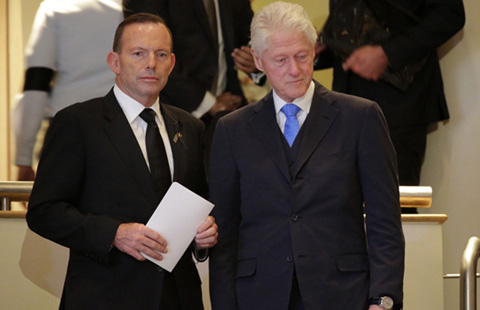'Belt and road' blueprint boosts practical cooperation
Updated: 2015-03-30 10:41
(Xinhua)
|
||||||||
BOAO -- The blueprint of the China-proposed belt and road initiative unveiled on Saturday will boost practical cooperation in key fields such as infrastructure, said analysts.
The action plan for the Silk Road Economic Belt and 21st Century Maritime Silk Road outlined the principles, framework, and cooperation priorities and mechanisms of the initiative.
The routes will run through Asia, Europe and Africa, connecting the vibrant East Asia economic circle at one end with the developed European economic circle.
Experts, politicians and business leaders, who attended the 2015 annual conference of the Boao Forum for Asia (BFA) in China's southernmost province of Hainan, said the plan responded to market concerns and set a direction for practical cooperation.
Bright prospect
The plan was issued by the National Development and Reform Commission, China's top economic planner, and the ministries of foreign affairs and commerce.
The initiatives have been established on four principles -- openness and cooperation; harmony and inclusiveness; market operation; and mutual benefits.
Policy coordination, connectivity, unimpeded trade, financial integration and people-to-people bonds are the five cooperation priorities.
"The market waited for this action plan for a long time," said Ha Jiming, chief investment strategist for the investment management division of China at Goldman Sachs.
The strategy shows the initiatives are more than a simple concept, he added.
Prince Saud, chairman of Saudi Basic Industries Corp., said cooperation and construction projects would bring benefits to countries along the routes, and push forward bilateral trade and economic activities.
In an interview with Xinhua prior to the BFA conference, Egyptian Ambassador to China Magdy Amer said his country was committed to revitalizing its economy and developing the Suez Canal corridor, and hoped more Chinese enterprises could invest and develop there.
No Marshall plan
Addressing the opening ceremony of the BFA on Saturday, President Xi Jinping said China would follow the principle of wide consultation, joint contribution and shared benefits when promoting the initiatives.
Xi promised that the programs of development will be open and inclusive, saying that they will be a real chorus comprising all countries along the routes.
Zheng Yongnian, director of the East Asian Institute at the National University of Singapore, regards the initiatives as an important factor in China's new round of the open-up.
"China is considering the real needs of the countries along the routes, rather than imposing its will on others. It is about negotiation," he said.
Dennis Bracy, CEO of US-China Clear Energy Forum, said the initiative would facilitate cultural exchanges and mutual understanding, thus, creating more economic and trade opportunities.
"It has the potential to connect continental Asia, big countries and small countries, creating prosperity for all," said Ravi Bhoothalingam, chairman of Indian Manas Advisory.
"It is a cooperative venture where everybody will participate together, so it is very different from the concept of Marshall Plan," he added.
Investment surge
Former Chinese deputy foreign trade minister Long Yongtu believes more Chinese companies will be encouraged to seek business opportunities abroad, bringing a new round of investment.
Yu Xubo, president of China's largest food company, COFCO Corp., said the initiatives represent an open Chinese market with more cooperation chances.
"As an agriculture company, we would like a better plan that facilitates trade and investment along the routes," he added.
Bishnu Raj Adhikari, managing director of Kathmandu College of Management in Nepal, believes the action plan has the potential to further promote Asian integration and common development.
"Nepal is between China and India, if the concept is implemented, Nepal will benefit," he said, adding that the next phase needed countries to consider how to implement the strategy.
- China to evacuate citizens from Yemen
- Two graft-involved Chinese fugitives taken back from Laos
- Consumer poll reveals products with lowest satisfaction scores
- China unveils action plan on Belt and Road Initiative
- BRICS countries consent to promote judicial cooperation
- Asian countries to seek win-win co-op: Xi

 Students show support for Earth Hour
Students show support for Earth Hour
 Sleep with fish at Tianjin aquarium
Sleep with fish at Tianjin aquarium
 Moments of beauty and strength at ISU figure skating worlds
Moments of beauty and strength at ISU figure skating worlds
 Pier Antique Show in New York
Pier Antique Show in New York
 Rio bay won't be clean for sailing: organizers
Rio bay won't be clean for sailing: organizers
 Tech tycoons' take on innovation in BFA
Tech tycoons' take on innovation in BFA
 World dignitaries at state funeral of Lee Kuan Yew
World dignitaries at state funeral of Lee Kuan Yew
 Sandstorm shrouds Beijing
Sandstorm shrouds Beijing
Most Viewed
Editor's Picks

|

|

|

|

|

|
Today's Top News
China, US 'cannot afford' maritime dispute
Focus shifts to cause of NYC explosion after 2 bodies found
Warship arrives to evacuate Chinese nationals from Yemen
'Belt and road' blueprint boosts practical cooperation
China-US 'new diplomacy' discussed
China eyes $2.5 tln annual trade volume with Belt and Road countries
Chinese Vice President attends Lee Kuan Yew's funeral
Youku Tudou faces class
action lawsuit
US Weekly

|

|







